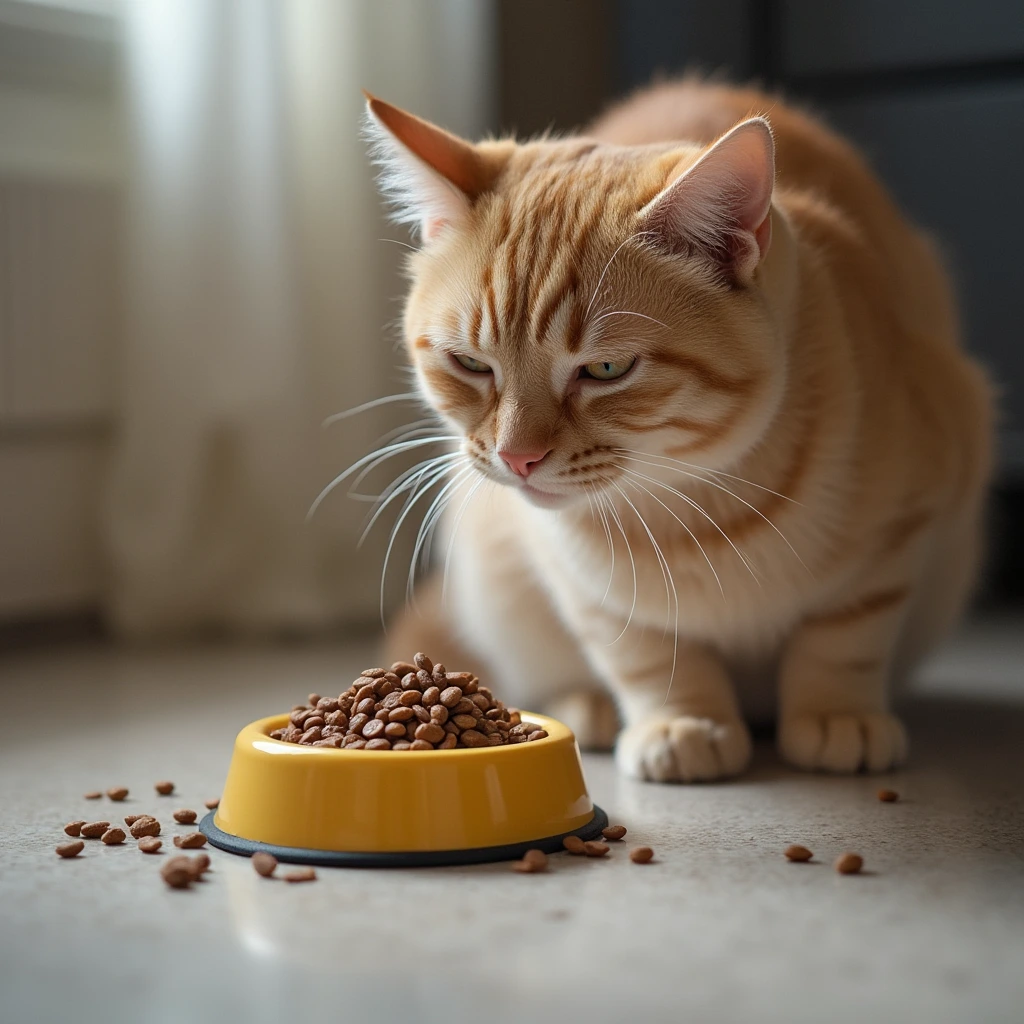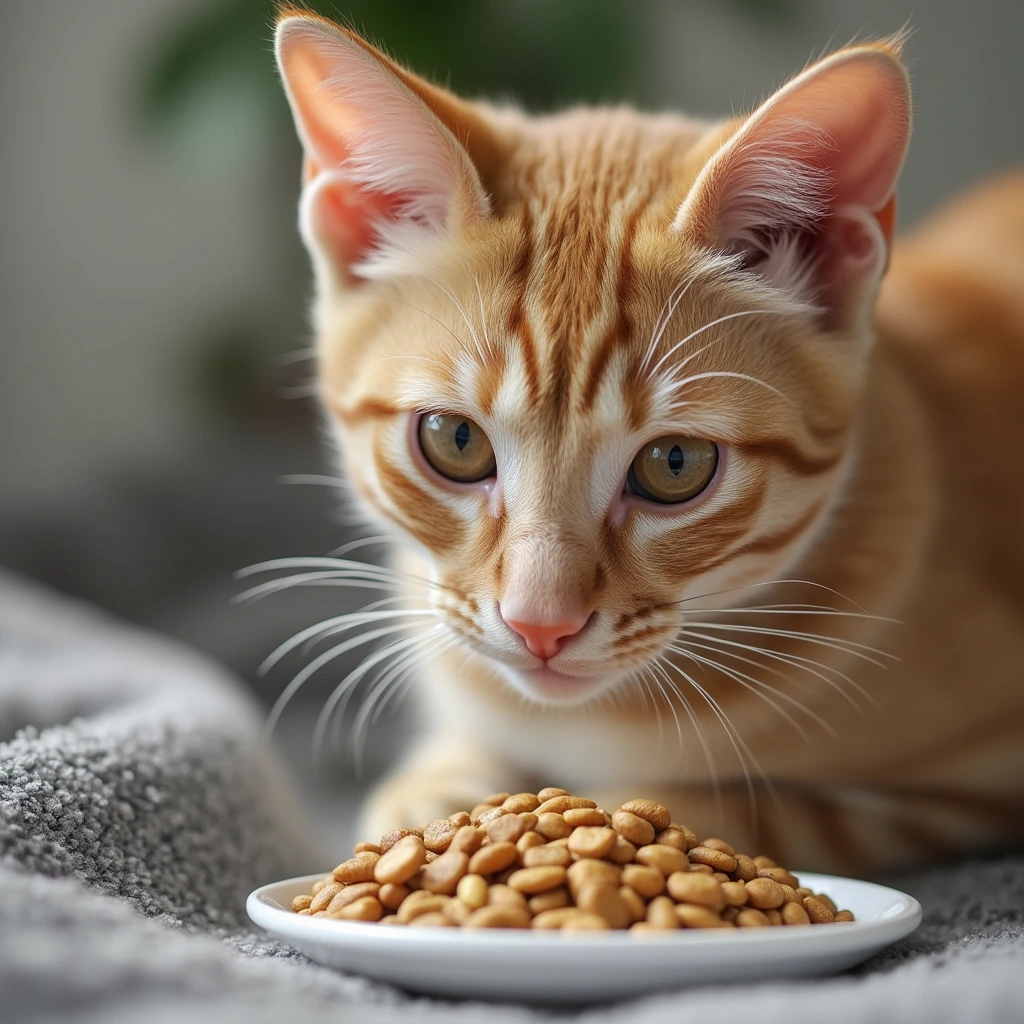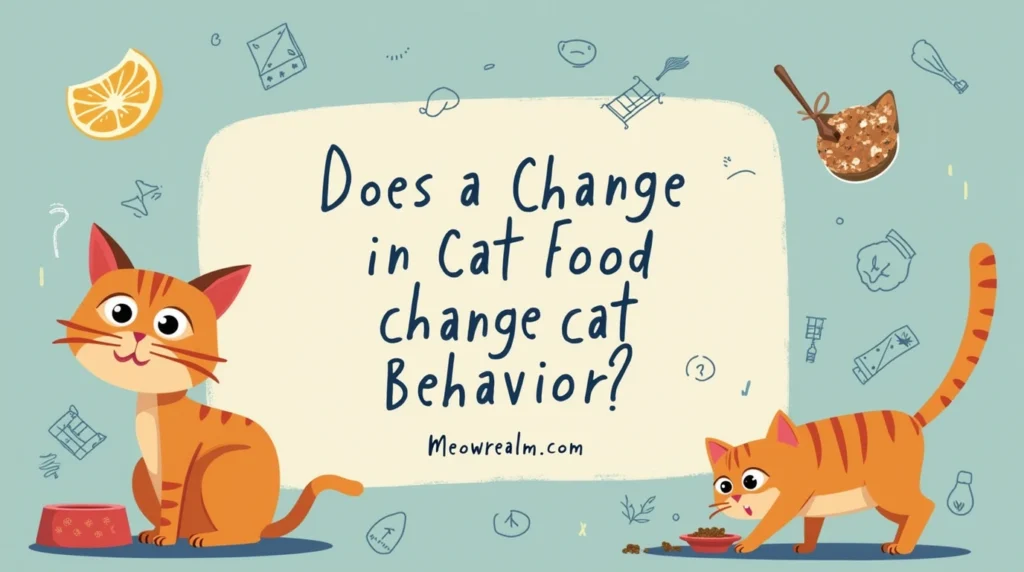Does a change in cat food change cat behavior As a pet parent, you’re likely always striving to give your cat the best. Whether it’s a comfy bed, fun toys, or daily affection, we all want our cats to be happy and healthy. But have you ever wondered: does a change in cat food affect your cat’s behavior? This is a question many pet owners ask when considering switching their cat’s food or trying out a new brand.
What might seem like a simple change in diet could lead to noticeable shifts in your cat’s behavior—some positive, and some not so much. You might notice your once playful cat becoming more lethargic, or perhaps your independent feline starts seeking more attention. Understanding how nutrition impacts your cat’s personality and well-being is essential.
In this article, we will explore how different diets can affect your cat’s behavior, including the link between specific foods and mood changes. We will also answer common questions you may have about how food changes can influence your furry friend’s actions and reactions.
Table of Contents
Understanding Cat Behavior
The Basics of Cat Behavior / does a change in cat food change cat behavior
Cats are known for their quirky behaviors, and as a cat owner, you likely have a strong understanding of how your pet typically behaves. Whether your cat is playful, affectionate, aggressive, or independent, their behavior is an important aspect of their health. But did you know that nutrition plays a huge role in these behaviors?
Some common cat behaviors include:

- Playfulness: Your cat loves to chase toys, pounce, and play around the house.
- Affection: Purring, rubbing against you, or following you around.
- Aggression: Scratching, biting, or hissing.
- Stress: Hiding, loss of appetite, or changes in litter box habits.
- Restlessness or lethargy: Not being as active or showing signs of exhaustion.
Understanding these behaviors is crucial, but knowing how to manage them with a balanced diet is even more essential. A cat’s behavior is often a reflection of their health, which is closely tied to what they eat.
The Link Between Nutrition and Behavior
You might be surprised to know that a change in diet can directly impact your cat’s emotional and physical state. Just as a healthy diet can support your cat’s vitality, an improper or poor diet can lead to behavior changes such as irritability, anxiety, or lethargy.
Cats are obligate carnivores, which means their bodies are designed to thrive on a protein-heavy diet. Therefore, the nutrients they consume—like protein, vitamins, and fatty acids—can influence their mood and behavior.
The Link Between Diet and Behavior
How Diet Affects Mood and Energy / does a change in cat food change cat behavior
The food you feed your cat has a direct connection to their energy levels, mental state, and behavior. Here’s how different types of diets can affect them:
- High-Protein Diets: Cats thrive on protein, and when they’re given food rich in high-quality protein, it can help them feel satisfied and maintain steady energy. High-protein diets can result in a more calm and relaxed cat since they are getting the proper nutrients to fuel their energy in a balanced way.
- Foods High in Carbs and Fillers: Unfortunately, many commercial cat foods are packed with fillers like grains or sugars. These ingredients are not only less nutritious, but they can also cause irritability or hyperactivity in some cats. Cats may also suffer from digestive issues, resulting in stress or lethargy.
- Nutrient Deficiencies: If your cat isn’t receiving the right balance of nutrients, such as taurine (an essential amino acid), it could cause mood changes, lethargy, or aggression. Deficiencies can also lead to more severe health problems, which will likely manifest in your cat’s behavior.
The Role of Specific Ingredients / does a change in cat food change cat behavior
Certain ingredients can also influence your cat’s mood and temperament. Some foods, for example, can promote relaxation, while others might increase anxiety. Here’s a quick look at some of the most important nutrients:
- Omega Fatty Acids: These are essential for your cat’s brain health and emotional well-being. Omega-3s in fish oils, for instance, can help reduce stress and promote a calmer demeanor.
- Taurine: A lack of taurine can lead to irritability and even aggression. Taurine is critical for eye health, heart function, and overall well-being, so be sure the food you choose contains this important nutrient.
- B Vitamins: These vitamins help your cat maintain energy and promote a healthy nervous system. B Vitamin deficiency can lead to anxiety or lethargy.
By choosing a diet that is rich in these nutrients, you can promote positive behavior changes and ensure your cat is emotionally balanced.
Types of Cat Food That Influence Behavior
Wet vs. Dry Food
One of the biggest debates among cat owners is whether wet food or dry food is better. While both have their pros and cons, they can influence your cat’s behavior in different ways:
- Wet Food: Wet food is higher in moisture, which not only helps prevent urinary tract issues but can also reduce stress. It’s often easier to digest, and the softer texture might be preferable for some cats. Cats on wet food diets tend to be more energetic and playful, with fewer instances of vomiting or lethargy.
- Dry Food: While dry food is convenient and can help keep your cat’s teeth clean, it’s often lower in moisture. Cats who eat dry food may suffer from dehydration, leading to possible behavioral changes such as lethargy or irritability. Furthermore, many dry foods contain more fillers than wet food, which can affect mood and energy levels.
High-Quality vs. Low-Quality Food
The quality of the food you feed your cat is another factor that can influence behavior. High-quality food contains more protein, fewer fillers, and essential nutrients that contribute to better behavior.
- High-Quality Food: Premium brands often provide a more balanced diet with ingredients like real meat, fish, and vegetables. Cats fed high-quality food tend to have fewer digestive problems and display calmer and more balanced behavior.
- Low-Quality Food: Low-quality food often contains meat by-products, fillers, and additives that can cause gastrointestinal problems or behavioral changes. Cats on low-quality diets may experience increased aggression, anxiety, or increased lethargy.
The benefits of high-quality food for your cat are clear. You’ll not only see improvements in their behavior but also in their overall health.
Identifying Behavioral Changes After a Diet Shift
When you change your cat’s food, it’s important to watch for any behavioral changes. Here are some things to look out for:
- Mood Swings: Your cat might become more withdrawn, stressed, or show signs of aggression if the new food doesn’t agree with them.
- Energy Levels: If your cat seems more lethargic or energetic than usual, it could be due to a shift in their diet. High-protein, balanced diets tend to stabilize energy levels, while sugary or low-protein foods can lead to peaks and valleys.
- Changes in Litter Box Habits: Dietary changes often lead to changes in digestion, so if your cat starts urinating or defecating more or less frequently, it could be time to review their food.
It’s important to give your cat’s body time to adjust to a new diet, but if you notice any drastic behavioral changes, consult your veterinarian.
Pros and Cons of Changing Cat Food

Pros – does a change in cat food change cat behavior
- Improved Behavior: A balanced, nutrient-dense diet can lead to more positive behaviors, such as reduced aggression, increased energy, and better affection.
- Better Health: Quality food supports long-term health, reducing the likelihood of illness and behavior-related issues.
- Weight Management: Switching to a more appropriate diet can help prevent obesity and related behavioral changes such as lethargy.
Cons – does a change in cat food change cat behavior
- Digestive Upset: Switching foods too quickly can lead to stomach upset, diarrhea, or vomiting. Always transition gradually.
- Expense: High-quality food can be more expensive, which might be a consideration for some owners.
- Adjustment Period: Your cat may take time to adjust, and it could take a few weeks for noticeable behavioral improvements.
cats attitude change -does a change in cat food change cat behavior
A cat’s attitude change can be triggered by a variety of factors, and it’s important to understand the root causes to address any underlying issues. Cats, known for their independence, can experience fluctuations in their behavior due to changes in their environment, health, or diet. For instance, a shift in diet can significantly alter a cat’s demeanor. A food that doesn’t agree with them might make them more irritable, aggressive, or withdrawn, while a more balanced diet can result in a calmer, more affectionate cat. Health problems like dental issues, arthritis, or even urinary tract infections can cause discomfort, making a cat less sociable or more prone to lashing out. Changes in their environment, such as moving to a new home, the introduction of new pets, or even changes in your schedule, can also lead to behavioral shifts. If your cat starts to show signs of aggression, withdrawal, or anxiety, it’s essential to observe closely and, if necessary, consult with a veterinarian to rule out medical causes. Understanding and addressing the reasons behind a cat’s attitude change is key to helping them return to their usual self.
cat change in personality: does a change in cat food change cat behavior
A cat’s change in personality can be both puzzling and concerning for cat owners. Unlike dogs, who may wear their emotions on their sleeves, cats tend to be more subtle with their feelings and behaviors. However, when a cat undergoes a noticeable shift in personality—becoming either unusually aloof, aggressive, or overly clingy—it often signals that something is wrong.
Health issues are one of the most common reasons behind a change in personality. Conditions such as pain, stress, or illness can cause a typically friendly cat to become distant or irritable. Similarly, a cat who is normally independent may suddenly seek more affection or act more needy if they’re feeling unwell or anxious. Environmental changes, such as moving to a new home, the addition of new pets or family members, or even changes in your routine, can also trigger shifts in personality. It’s important to closely monitor your cat’s behavior and seek veterinary advice if the change is sudden or prolonged. By identifying the cause, whether physical or emotional, you can help restore balance and help your cat feel more at ease.
cat behavior changes: does a change in cat food change cat behavior
Cat behavior changes can occur for a variety of reasons, and it’s essential to understand the potential causes behind these shifts to maintain your cat’s well-being. A change in behavior might manifest as altered eating habits, increased aggression, excessive grooming, or a sudden withdrawal. Health issues are often the culprit behind these changes, as discomfort or illness can cause your cat to act out of character. For example, a cat with a urinary tract infection may begin urinating outside the litter box, while a cat in pain might show signs of aggression or irritability. Similarly, stress caused by changes in the home environment, such as a new pet, a move, or even changes in your routine, can trigger anxiety or behavioral shifts. Dietary changes can also play a role, as a food that doesn’t suit your cat can lead to digestive discomfort, lethargy, or mood changes.
It’s important to observe your cat closely when behavior changes occur, as they may be signaling something more significant, like a medical issue or emotional distress. In such cases, consulting with a veterinarian is often the best way to identify the root cause and get your cat back to their usual, happy self.
FAQ: Does a Change in Cat Food Change Cat Behavior?
1. How long does it take for a cat’s behavior to change after switching food? (H3)
It can take anywhere from a few days to a few weeks for you to notice behavioral changes, depending on the cat and the type of food.
2. Can switching cat food cause aggression? (H3)
Yes, some low-quality foods with added sugars or fillers can make your cat irritable or aggressive. Make sure to choose food with high-quality ingredients.
3. What are the best foods for calm cat behavior? (H3)
High-protein, grain-free foods with omega-3 fatty acids and taurine are excellent for promoting calm behavior in your cat.
4. Can a food change affect my cat’s litter box habits? (H3)
Absolutely. Dietary changes can lead to differences in stool consistency and frequency. It’s a good idea to monitor their litter box habits when changing foods.

Conclusion does a change in cat food change cat behavior
Does a change in cat food change cat behavior? The answer is yes! Diet plays a vital role in shaping your cat’s mood, energy levels, and overall behavior. By providing the right nutrients, you can improve their health and ensure they feel emotionally balanced and physically strong. While switching foods can lead to a few bumps along the way, the long-term benefits for both your cat’s health and behavior are well worth it.
If you’re looking for premium cat food that promotes better behavior and health, explore our selection at www.meowrealm.com. Share this article with other cat parents and help them make informed decisions about their pets’ nutrition and well-being.
does a change in cat food change cat behavior – does a change in cat food change cat behavior -does a change in cat food change cat behavior

